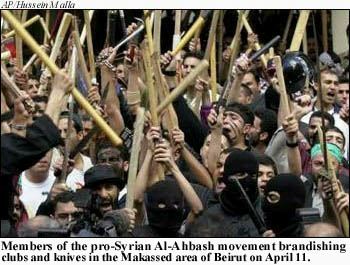 |
| Vol. 3 No. 4 | Table of Contents MEIB Main Page | April 2001 |
| | Al-Ahbash Lebanon |
by Daniel Nassif
 |
Syria's control over al-Ahbash has been clearly evident in recent weeks. After a number of prominent Sunni Muslim figures in Lebanon expressed opposition to the Syrian occupation, members of al-Ahbash were quickly mobilized by Syrian intelligence to stage a series of rallies on April 11. Dressed in black and wearing face paint and masks, the al-Ahbash members chanted pro-Syrian slogans before the TV cameras while waving nail-encrusted broomsticks, kitchen knives, brass knuckles, chains, axes, old rusted swords and hammers.
Background
The Ahbash are the followers of Sheikh Abdullah Ibn Muhammad Ibn Yusuf al-Hirari al-Shibi al-Abdari, also known as Abdullah al-Habashi, signifying his Ethiopian origins. Sheikh Habashi was born in 1920 in al-Hirara, Ethiopia, where he studied Shafii juriprudence and became a Mufti. In 1947, the Sheikh was deported to Saudi Arabia by former Ethiopian Emperor Haile Selassie. A year later, the Sheikh moved to Damascus to study with the Rafaiiyya and Qadiriyya Sufi orders. In 1950, he made Beirut his home and started a campaign of recruitment. In 1983, the Sheikh's followers took control of the Society of Islamic Philanthropic Projects that was originally formed by Sheikh Ahmad al-Ajuz in 1930.
The Ahbash's belief system mixes elements of Sunni and Shi'ite theological doctrines with Sufi spiritualism. It includes the following tenets that are regularly publicized in Manar al-Huda, the society's journal:
Al-Ahbash opposes Islamic fundamentalist movements inspired by the writings of Ibn Taymiyya and Sayyid Qutb, like the Muslim Brotherhood and Al-Jama'a al-Islamiyya. It also opposes revolutionary action against authority. Islamic fundamentalist groups in Lebanon see al-Ahbash as an imposter organization trying to use the power of the Syrian regime to increase its political influence in Lebanon. In August 1995, a radical Islamist group called the Islamic Band of Helpers (Usbat al-Ansar al-Islamiyya) assassinated the leader of Al-Ahbash, Sheikh Nizar al-Halabi. Three of the assailants were executed.
Halabi's deputy, Sheikh Husam Qaraqira, became the organization's leader thereafter. Not surprisingly, Qaraqira graduated from an Islamic seminary in Syria
Notes
1 For more on the belief system and ideology of Al-Ahbash, see Nizar Hamzeh and Hriar Dekmejian, "A Sufi Response to Political Islamism: Al-Ahbash of Lebanon, " The International Journal of Middle East Studies 28 (1996), 217-229.